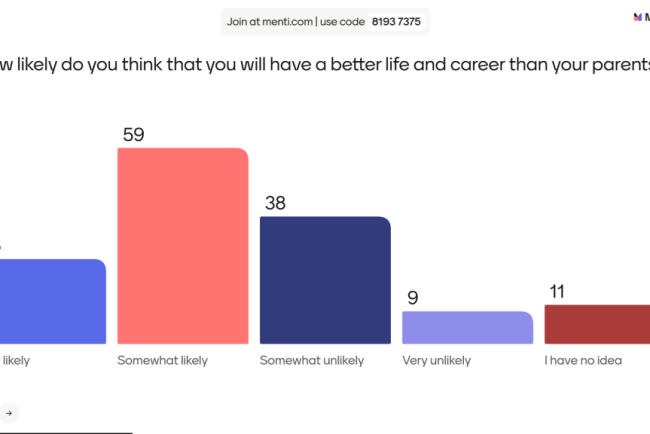
by Admin
3 BIG Resume Mistakes (That Are Easy To Fix)
When you’re looking for a new job, your resume is your calling card. It’s often the first impression a potential employer will have of you, and in today’s competitive job market, you can’t afford to get it wrong. A strong, well-crafted resume can open doors, […]
Career development
by Admin
#1 Communication Sin That Is Hurting Your Career
A good friend reached out to me regarding a problem he was having at work. Let’s call him Bill. Bill was part of a project team that was working on a hot new service his company wanted to create for their existing customers. He was […]
Career development
by Admin
Workplace Disagreements: How To Handle Them The Right Way
The workplace is a dynamic place. Unfortunately, any time multiple human beings get together, there is potential for conflict. Disagreements in the workplace can be unpleasant. Assuming two people are at odds with one another, that negative vibe can quickly spread through a team or […]
Career development


How To List A Company That Changed Names On Your Resume And LinkedIn Profile
by Admin
What do you do when the company you worked for has changed names multiple times? What should you put on your resume? How should you list it on LinkedIn? This is a common issue, and handling it incorrectly can raise red flags for recruiters. If […]
Career development
What do you do when the company you worked for has changed names multiple times? What should you put on your resume? How should you list it on LinkedIn?
This is a common issue, and handling it incorrectly can raise red flags for recruiters. If the company name isn’t recognizable or doesn’t exist anymore, hiring managers might question your work history—or worse, disqualify you from consideration.
To ensure your resume and LinkedIn profile are accurate and optimized, follow this simple strategy.
How to List a Company That Changed Names
When a company is acquired, rebranded, or merged, it’s crucial to present the most current name on your resume and LinkedIn profile. Here’s the right way to format it:
- Use the company’s current name as it appears today.
- Include previous names in parentheses to provide clarity.
Example Formatting:
If you were a marketing manager at a company that went through two name changes, list it like this:
Marketing Manager, ABC Company (formerly 123 Company and DEF Company)
This format ensures recruiters can verify the company’s legitimacy while preserving your work history.
Why This Matters

Recruiters fact-check company names to confirm your experience and credibility. If they can’t find the company you listed, they might assume the information you provided is inaccurate or fabricated. By clearly stating the current company name and its former names, you eliminate confusion, authenticate your experience, and maintain trust.
What NOT to Do

- Don’t waste bullet points explaining the name changes. Instead, use that space to highlight your achievements.
- Don’t include unnecessary company background details. Recruiters can look up company history if they need more context.
- Only list quantifiable accomplishments in your bullet points. Focus on results, not job descriptions.
Want More Resume and LinkedIn Tips?
Your resume and LinkedIn profile should be optimized to make a strong first impression. If you want a step-by-step guide on how to craft a standout resume and LinkedIn profile, check out my Job Search Bootcamp. It’s free, and you’ll find expert resources to help you navigate today’s job market successfully.
Get access to my Job Search Bootcamp by signing up for my Free Resource Center today (no credit card required!).
Small mistakes can cost you big opportunities. Make sure you’re listing the right company names on your resume and LinkedIn profile—and optimizing them for success.
Good luck. Go get ’em!

by Admin
Surviving the future: Why you shouldn’t worry about robots, but should worry about your career
Last week I was invited to speak at the Nottingham Business School as part of their Future of Work conference. I talked about career as our pathway into the future and argued that we need to think about the future critically and positively as we […]
PresentationsLast week I was invited to speak at the Nottingham Business School as part of their Future of Work conference.
I talked about career as our pathway into the future and argued that we need to think about the future critically and positively as we plot our own careers into it. This is what I had to say…
As part of this presentation I had the opportunity to run a few polling questions with current undergraduates. Even better, I also have last years data to compare it with from when I gave a version of the presentation last year.
So, I started by asking them whether they believed that their lives would be better than their parents.

While the group was fairly positive, they were slightly less positive than last year, perhaps reflecting the way that the political economy is moving at the moment.
Next I asked them about what they were worried about.

Most focused on individual issues relating to their own career, but there was also considerable concern about what kind of world they were living in with concerns about inequality, AI and world war being raised. Last year war dominated these contextual concerns and relatively few people raised inequality. I continue to be surprised about how unconcerned people seem about climate change, which seems to me to be the biggest and most certain threat.
Next I asked them about how important they felt it was to have decided on a career by the time they left university.

This was a kind of trick question, as my message was really about being prepared for change and dynamism within your career, but it is clear that there is still a real desire amongst students to be ‘sorted’ in their career by the time that they leave university. Good luck to them. If anything this desire for certainty has grown since last year.
Finally I asked them what they felt at the end of the presentation.

In general people felt that ‘life is what you make it’ which was the theme of my remarks. But, there was also a big, fatalistic, group who felt that ‘what happens, happens!’ viewing their career as a path on which they couldn’t exert all that much influence. The proportions were fairly similar to last year, although the ‘we’re all doomed’ contingent had grown somewhat.
Given this I think that there are reasons to be optimistic about young people’s career. People are continuing to dream big dreams for the future and believe that they can make their lives and the world into something better. I hope that they are right.

by Admin
3 Tips For Crushing Monday Mornings
Got a touch of the “weekend flu” or the “Monday blues” this week? You’re not alone. However, you shouldn’t let that get you down! Mondays can be tough, but you can get through them—we have faith! The good news? With the right mindset and a […]
Career development
Got a touch of the “weekend flu” or the “Monday blues” this week? You’re not alone. However, you shouldn’t let that get you down!
Mondays can be tough, but you can get through them—we have faith! The good news? With the right mindset and a few simple strategies, you can make Monday mornings better and start the week off strong.
Don’t let Monday get the best of you. Here are some tips from J.T. O’Donnell, LinkedIn Influencer and founder and CEO of Work It DAILY, on beating the Monday blues.
1. Plan Your Day Out On Sunday (Or Friday)

When you know exactly what you’re going to be doing on Monday morning, it’s easier for you to mentally prepare and ease into the workweek. Otherwise, you can walk into the office frazzled, confused, and unorganized, which can set you back a few hours.
One of the best ways to make Monday mornings better is to plan ahead on Sunday or Friday. Set priorities, outline key tasks, and leave yourself clear notes to jumpstart your productivity. A structured start prevents that dreaded feeling of overwhelm and helps you hit the ground running.
2. Focus On Being Positive And Upbeat

Try to avoid people who are being “Debbie Downers.” You don’t need that extra gloom and doom on a Monday. Focus on spending your time with positive and upbeat people. Positivity is key! Surrounding yourself with optimism can set the tone for a productive start to the week.
If you’re wondering how to make Monday mornings better, start by engaging in uplifting conversations or listening to motivating podcasts. A little inspiration can go a long way in helping you shake off the Monday blues and step into the week with confidence and a smile on your face.
3. Endorse Others

There’s no better way to feel good about yourself than to cheer on and support others. That’s why Mondays are a great time to endorse your colleagues on LinkedIn. (In fact, we call Mondays “Endorse Day.”) When you reach out and tell someone that you think they’re special, they will likely return the favor. Is there a better way to stay positive than to get compliments?
But making Monday mornings better isn’t just about spreading positivity; it’s also about setting the right tone for your week. A quick act of kindness, like endorsing a colleague, can boost your mood and remind you that work is about connection, not just tasks. Plus, when you start your Monday mornings with a feel-good ritual, you create momentum that carries into the rest of your week.
There you have it! The key to making Monday mornings better is setting yourself up for success the night before and starting the day with positive habits. Remember, small changes can have a big impact, so experiment with what works best for you and build a routine that makes Monday mornings something to look forward to.
We hope these quick and easy tips help you crush Monday mornings and finally beat those Monday blues. You’ve got this!
Unhappy in your career? We can help!
Get access to our Free Resource Center today (no credit card required!).

by Admin
Presentation to the ILO Africa Skills Hub
Today I had the opportunity to present with Dr Pedro Moreno da Fonseca of the International Labour Organisation to the ILO’s Africa Skills Hub. We discussed the value of thinking about career, career development and career guidance to the achievement of a range of policy […]
PresentationsToday I had the opportunity to present with Dr Pedro Moreno da Fonseca of the International Labour Organisation to the ILO’s Africa Skills Hub.
We discussed the value of thinking about career, career development and career guidance to the achievement of a range of policy aims for African countries. We presented the career development framework that we developed for the ILO last year and talked about the range of ways that it could be used in policy and practice.
Hopefully this will lead to some new engagement with the tools.
This is what we presented…

by Admin
Engaging with social justice in your work – Presentation to Solihull careers hub
Yesterday Keren Coney and I presented to careers advisers in the Solihull Careers Hub. This was part of a new initiative by the Hub to provide a developmental space for careers advisers. We really welcome this and are keen to support both careers leaders and […]
PresentationsYesterday Keren Coney and I presented to careers advisers in the Solihull Careers Hub. This was part of a new initiative by the Hub to provide a developmental space for careers advisers. We really welcome this and are keen to support both careers leaders and careers advisers and recognise that sometimes this is best done together, and sometimes seperately.
We were asked to talk about career guidance and social justice. The presentation follows, but essentially it consists of me talking about the 5 signposts model that I developed with Rie Thomsen and Ronald Sultana, and Keren using this framework to provide a deeper example of her social justice work with neurodiverse students.
Hope that you find it useful…

by Admin
Introducing The Career Development Handbook
Last week we ran a webinar to provide an introduction to The Career Development Handbook. Just in case you have missed it, this is a new book written by Gill Frigerio, Rosie Alexander and myself. The book is designed to give a comprehensive introduction to […]
PresentationsLast week we ran a webinar to provide an introduction to The Career Development Handbook. Just in case you have missed it, this is a new book written by Gill Frigerio, Rosie Alexander and myself. The book is designed to give a comprehensive introduction to the field and practice of career development. The book is idea for people studying on Level 6 and 7 programmes, or for established professionals who want to keep up to date with the latest innovations in the field.
We recorded the webinar, so you can access it if you missed it.
We would also like to invite people to a full one-day workshop on the 6th March. Where we will be getting into the book in a lot more detail. We’d love to see you there.

by Admin
Using the The Career Development Handbook: A one day workshop
Thursday 6th March – 9.30am to 4.30pmLocation: Kedleston Road Campus, Derby DE22 1GB£125 At the start of March we are offering a once in a lifetime opportunity to spend the day with me, Gill Frigerio and Rosie Alexander for a one day workshop exploring The […]
PresentationsThursday 6th March – 9.30am to 4.30pm
Location: Kedleston Road Campus, Derby DE22 1GB
£125
At the start of March we are offering a once in a lifetime opportunity to spend the day with me, Gill Frigerio and Rosie Alexander for a one day workshop exploring The Career Development Handbook.
The workshop will help you to:
- Understand the resources offered by the Handbook for Career Development Professionals.
- Identify how the book can be used in training and supporting Career Development Professionals in a range of different contexts, including initial training programmes, organisational settings and in CPD activities
- Reflect on your own practice as advanced practitioners
All attendees will also receive a copy of the book.

by Admin
Imaging education for the green transition and the future of work: Presentation to the Jeju education for designing a happy future
Yesterday I was set to fly to South Korea to address the Jeju education for designing a happy future conference. But, sadly the imposition of martial law gave me pause for thought and I decided not to get on the plane. Thankfully it now appears […]
PresentationsYesterday I was set to fly to South Korea to address the Jeju education for designing a happy future conference. But, sadly the imposition of martial law gave me pause for thought and I decided not to get on the plane. Thankfully it now appears that the coup has been defeated and South Korea’s democracy will endure.
Because of this I ended up getting up this morning at 3.30am to present to the conference remotely. But, the conference went ahead and it proved to be a really interesting event, even if I had to attend remotely. In it presenters talked about the future and how to make sure that the education system prepared young people for the future and also tried to ensure that it will be a happy future.
At the moment I’m struggling to feel fully optimistic about the future, but I remain certain that the future is contingent on the actions of human beings. The recent events in South Korea demonstrate this far better than any lecture that I can give. When people rise up and assert the future they want they can achieve it. This leaves the important question as to how the education system can foster this kind of individual and collective agency and help people to become the authors of their own future. It is to this that my presentation tried to speak.
So, this is what I had to say.

by Admin
Breaking through… Why career development matters for people, for politics and for the profession
I’ve spent the last couple of days at the CDI conference. This was a great experience and was the biggest of these conferences since the pandemic. We heard some very encouraging things from the Department for Education (although there is still some considerable way to […]
PresentationsI’ve spent the last couple of days at the CDI conference. This was a great experience and was the biggest of these conferences since the pandemic. We heard some very encouraging things from the Department for Education (although there is still some considerable way to go with this).
I felt that there was a very positive atmosphere. Although careers work has been pretty beleaguered for the last decade, there was a sense that the new government might offer better things. Some of us were daring to hope for the better. Let’s hope that the government can deliver on their promise.
I gave a keynote about the nature of careers and careers work and tried to remind everyone that this is complex and important work. This is what I had to say.

by Admin
Book your place for iCeGS annual lecture 2024: Professor Guðbjörg Vilhjálmsdóttir on ‘counselling socially disadvantaged clients’
The iCeGS annual lecture will take place on the 20th November 2024 at the Kedleston Road, Derby Campus. Attendance is free, but pre-booking is essential. The lecture will be given by Gudbjörg Vilhjálmsdóttir, Professor Emerita, University of Iceland and Professor at the Inland Norway University […]
PresentationsThe iCeGS annual lecture will take place on the 20th November 2024 at the Kedleston Road, Derby Campus. Attendance is free, but pre-booking is essential.
The lecture will be given by Gudbjörg Vilhjálmsdóttir, Professor Emerita, University of Iceland and Professor at the Inland Norway University of Applied Sciences. She will discuss the evidence on ‘counselling socially disadvantaged clients’.
Although research and daily experience show that social variables are decisive in career development, they remain underrepresented in the research field of counselling and guidance, which often focuses on psychological variables. Guidance services have expanded from schools to a more general adult population, particularly low-skilled workers in precarious labour market positions, requiring counsellors to adapt their methods. Blustein’s psychology of working theory and Bourdieu’s habitus theory place social variables at the centre of career development, critiquing the notion of free will that dominates traditional theories.
In this lecture, the presenter will share research findings that demonstrate how social class and gender influence career choices, such as studies showing that leisure activities and habitus shape occupational preferences and aspirations among 16-year-olds and young adults. Another study based on Blustein’s theory reveals that low-skilled youth feel less control over their futures, with aspirations limited by social constraints.
There will also be a discussion about how the Career Construction Interview (CCI), a narrative-based method, helps disadvantaged clients by combining micro-narratives into an empowering macro-narrative, supported by case examples from research on low-skilled women. Finally, the Bourdieusian concepts of socio-analysis and habitus will be explored for their potential use in enriching the analysis of career stories in counselling.



















